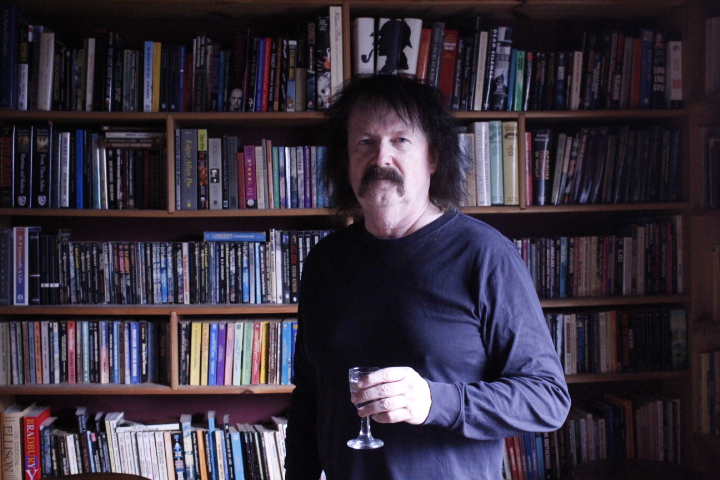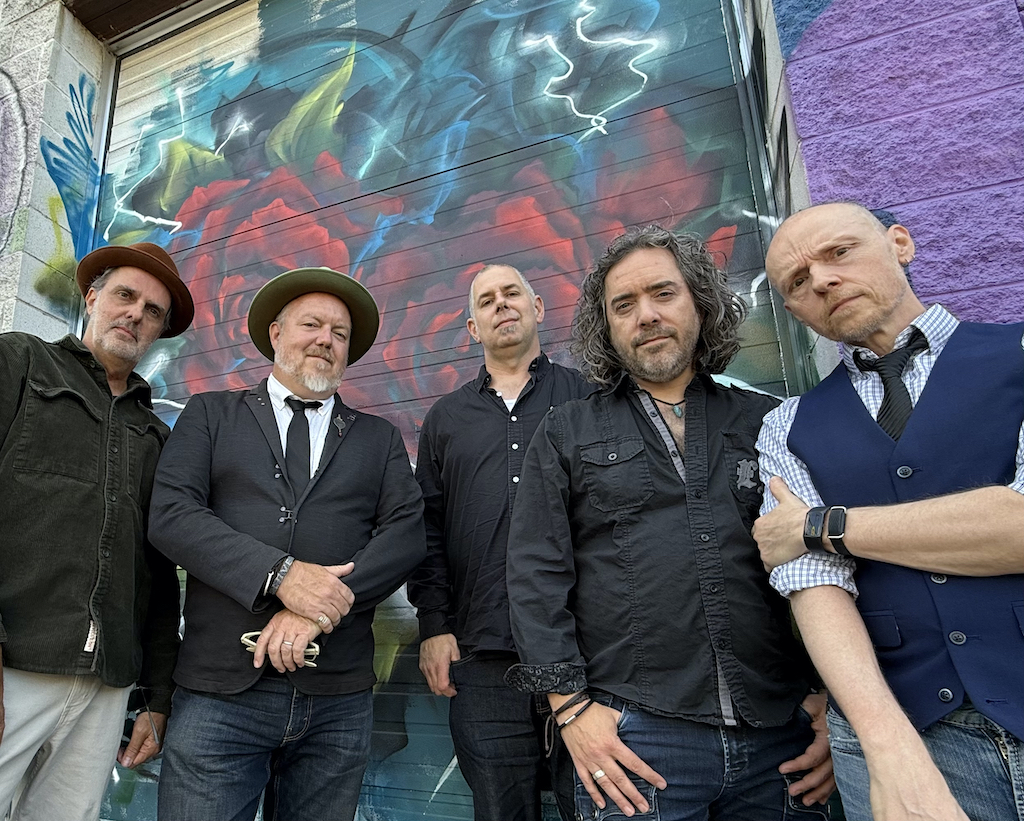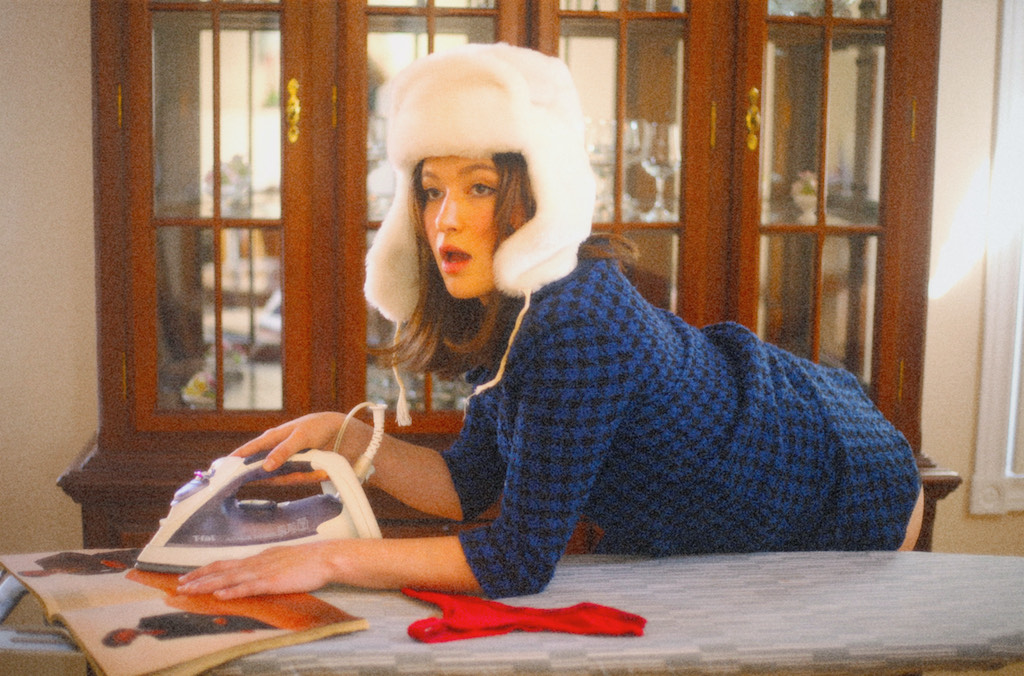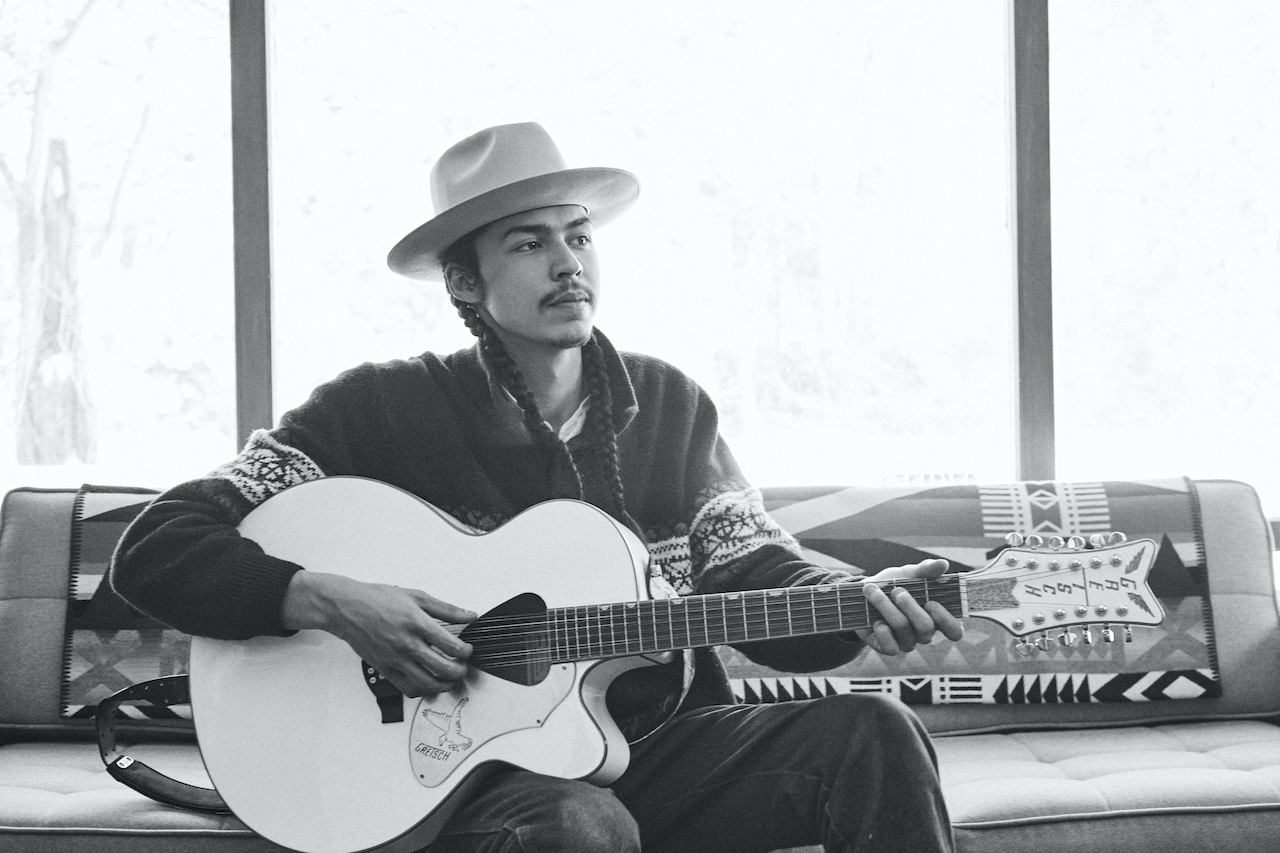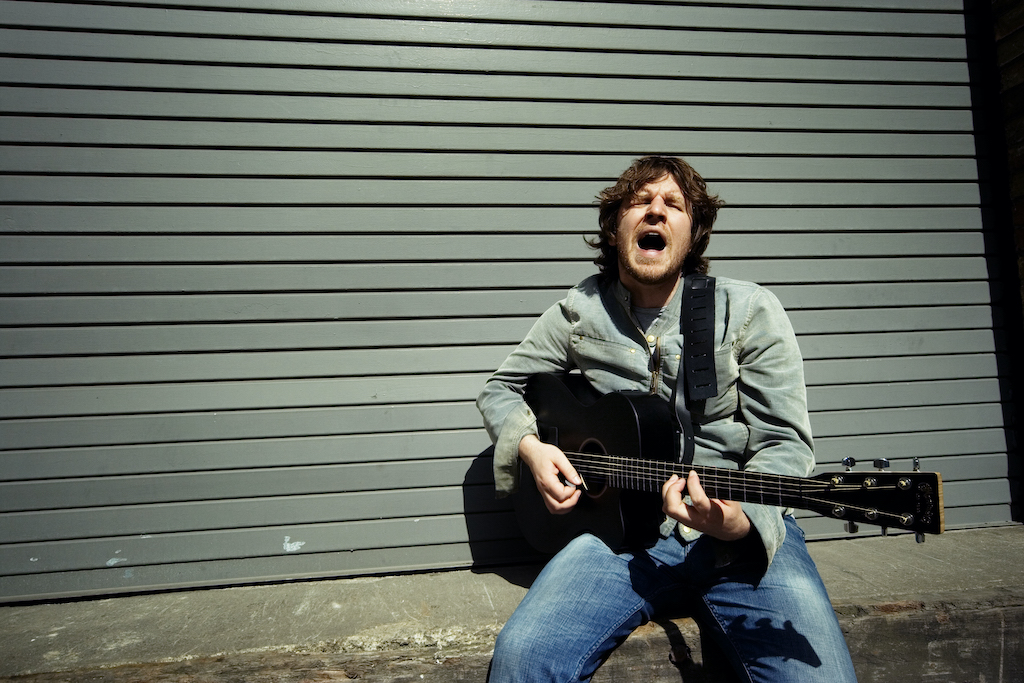I’ve never met Bob Dylan.
But I’ve met Bryan Leckie of the Krueger Band, and it’s probably as close as I’ll get. I don’t know if Leckie would be happy with the comparison. I know he’s a Bob fan, but I don’t know if he sees himself that way.
He might prefer Edgar Allen Poe. Both are figures he brought up in our first conversation after I wandered into his print shop one afternoon. I came in to put up a poster, and I left an hour later with a Krueger Motel CD in my hand and a fascination with this Dylan-esque character that I’d heard so much about.
In one of our conversations in his ‘sitting room’ (crafted with two chairs by his shop window where I imagine he finds inspiration for songs watching the characters of Owen Sound walk by), he tells me he’s got a “really cool thing” to tell me that’s absolutely true, he says.

He leans back and launches into his story: “While we were recording over at Trevor’s [Mackenzie]…and we…were figuring out the arrangement, we were asking ourselves ‘is that right?’ and I said ‘that’s not the way I heard it in the future.'” He stops and offers one of his classic smiles that pushes his black handlebar moustache up towards his nose.
“And I say that all the time. There’s no reason for making this judgement other than this vague feeling that that’s not how it goes. That’s not they way I remember it in the future.”
“So we finished the whole CD, and it’s out. And about a week later I’m at Metro talking to the lady that usually checks me out and it turns out she lives in the house I used to live in when I was a kid,” he says and stops to go turn down the Phil Ochs playing from his shop stereo.
He joins me again and continues. “So I said [to her] ‘If I give you this CD, will you play it in the house?’ So she played it in the house I grew up in from the future to me in the past.”
“Maybe I have heard it when I was a kid,” he says.
The armchair psychologist in me wondered if this is an unconscious way of making music that the future Leckie will enjoy. So I ask him if he’s worried about his future self liking the albums he produces.
“Me?” he asks. “I don’t care.” And laughs.
But are you ever concerned about the longevity of the music? I follow up.
“No, you just do the best you can. Paul Simon said you work on it as hard as you can until it’s the best you can do and let it go. You’re not going to make it any better after awhile.”
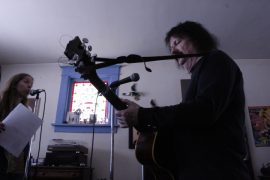
Our next meeting takes place at his house. He’s invited me to one of his rehearsals with new Krueger singers Corrie Martindill and Lisa Stethem. He didn’t tell them I was coming, so when I showed up with pen and camera in hand, they were a little surprised. He first leads me into the kitchen – it’s the bar, and offers me a drink, I choose bourbon and wander the house. Some rooms he’s filled with records and CDs, some with books, some with instruments. The walls are lined with posters of the very things that influence his writing.
It’s Poe that hangs from numerous spots in the living room looking down in his macabre fashion on the rehearsal taking place. Corrie and Lisa are new to the band, an ever changing crew that rotates around the enigmatic front man who keeps the Krueger machine rolling. Some of his constants over the years have been Trevor Mackenzie, Larry Dickinson, Rob McLean and Dave Farrar. His previous singers have been Lauren Jewel, Josi Elder, and Silvie Kindree.

“You don’t want to hang outside the song,” he says to his new bandmates, Corrie and Lisa, as they rehearse one from their setlist. “Take control of it,” he advises, and follows up with one of those classic smiles I mentioned. They launch back into the song.
They’re rehearsing for the upcoming Heartwood Hall show on April 26, billed as The Show They Never Gave – perfectly titled if you know Leckie’s reverence for all things cryptic. I came to understand this side of him when he explained the band name to me, which is also the title of his first album, Freddy Krueger’s Hat.
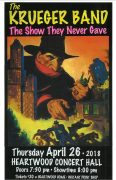
It isn’t what you think. Leckie isn’t obsessed with the character Freddy Krueger, or even the movie Nightmare on Elm Street.
No, he’s more interested in the one scene when the girl wakes up from a dream she met Freddy in, and when the scientists don’t believe her, she produces the hat. The hat is the thing that can’t be explained. “Here’s this. It can’t be, but here’s this,” he mimics to finish the story.
And that’s what fascinates Leckie – the things that are that just can’t be. He’s got a talent for taking pieces from pop culture and turning them into his own creations. And these creations span an output of more than 9 albums. His stories and his songs are adventures through pop culture history drawing on everything from the X Files to Marilyn Monroe to Hitler’s dog to the JFK Assassination.
Songs like Dagwood and Blondi and Wooly Bully Blues are perfect examples of his ability to weave cultural figures, events, places and together. In the former he sings: “Dagwood and Blondi walked the hills of Paraguay/ Dreaming of Germany, oh so far away/ Hotel Delago is bathed in the light of the moon./ Wines of rare vintages breathe on the balcony/ Blood red roses, The Flight of the Valkeries/ Black forest cake served on candle-lit tables for two.”
There’s enough in those lyrics that could fill an hour of an English lit lecture. Plus, I love that he rhymed ‘balcony’ with ‘Valkerie’.
And that’s what makes him so similar to Bob Dylan. It’s not just the way he looks with his wavy black hair and dark outfits. It’s not even the way he talks, but it’s the connections he makes in his songs to all the things he’s collected in his life. He’s absorbed so many fascinating characters, stories, and titles that create narratives only he can tell. And he’s fascinated by the way words sound together.
“I wanted to make Krueger more of a Edgar Allan Poe character. I just like the sound of the name,” he says to finish up his justification for its central role in his music. The sound of the words is something that many lyrical musicians are concerned about, including Dylan and Paul Simon, and it’s no wonder that Leckie is too. He’s very well read, and was actually on his way to teach high school English after university but found there were no jobs waiting for him. He opted to start a print shop instead, which he’s been doing for forty years. It’s worked out well for him as a place to listen to music, entertain visitors, and above all write hundreds of songs.
And over those years, he’s written himself into Owen Sound’s musicology. He’s played Summerfolk a few times, including the very early years. He tells me he even ordered a bunch of his CDs leading up to the festival performance only to have them arrive on the Monday following. He’s full of stories like this one, and I’m pulling them out of him slowly.
He’s quietly built himself into a musical icon in this region and I’m surprised his music hasn’t traveled further. It’s got everything to give it mass appeal, while also appealing to the serious music lovers. He experiments on each album by taking on genres of folk, country, blues, and doo-wop. He surrounds himself with talent, so his band is tight. But he admits it’s hard to get people together these days to rehearse. He actually holds his rehearsals in stages with different members at different times.
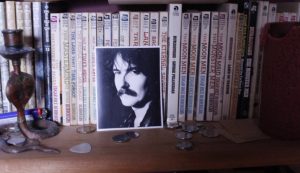
It’s clear from talking to him that he’s always got music on his mind. “It’s what I do all day. I’m writing a song write now,” he says. And he takes his time with them. They are crafted well so that a listener can enjoy them on many levels.
He wants you to enjoy each song sonically, but if you listen closely, there’s a lot to take away. One of my favourite verses is from the Ghost of Elvis where he penned the lines: “Philip Jose Farmer said to Philip K Dick/ Let’s rent a bus and pick all the best writers up in it/ The driver said, “I think you’ve let your standards get too soft.”/ They let T.S. Elliot on and they let Ezra Pound off”
See what I mean?
But there’s a problem with this kind of songwriting – he worries that it’s in danger of becoming obsolete.
“We used to have a common mythology,” he says. “Now that I’m getting older I’m losing [it]. You could pull on characters and everyone knew who they were…they’re drifting away,” he says as he references things like Seinfeld and the Ed Sullivan show.
He tells me his songs stay with him until they’re ready to come into the world. Sometimes it takes the right person, like ex-Krueger singer, Lauren Jewell, who coaxed Far Country out of him after 40 plus years of having it half written. “The song is about the stages of a person’s life…I didn’t know I’d have to live the damn thing. But then she sang it and it was done. I didn’t know it was a girl’s song. It isn’t, it’s about a guy,” he says and laughs. But his approach works for him. He doesn’t force it and eventually the songs get finished when they’re meant to be finished.
“It’s this vague thing,” he says. “You head off into the woods…looking for this and you find that. Songs start arriving. You never know what’s going to show up.” And they show up at odd hours of the night. “I wanted a song for Lisa [Stethem] to sing…but it wasn’t working… and then late one night, there’s a knock at the door, and there’s a song there…’I’m the song for Lisa’.”
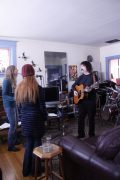
It turned out to be a song about Lisa instead of a song for her. It’s called The Girl with the Toque and the Smile and you just might hear it on the 26th at Heartwood. The song’s got some great lines like “She sits on a bench and lights up a smoke/ Like an old punchline in a tired old joke/ The Queen of Hearts in a five dollar coat/ She’s in love.”
He’s also written a song dedicated to Heartwood Hall, where he’s performed previously, a show billed as Krueger Meets Dylan, which reinforces my original theory and makes me think Leckie would be okay with the comparison after all.
With all these new songs, I assume there must be a new album in the works. Considering Krueger Island was a double, and Krueger Motel was a triple, I ask him what he plans for the next.
“It’ll be a five” laughs.
I think he’s joking, and he probably is, but you never know with Leckie. And considering the amount of songs he’s created over the years, I wouldn’t be the least bit surprised if he releases a five disc album.
The funny thing is that while I’m interviewing him, I get the feeling that he’s figuring out how to use our interaction in a tune. He already told me he’s writing a song right now, so I know I’m at risk of becoming a line in it, a cryptic line I expect.
I just hope he doesn’t call me Mr Jones.
Written by Jesse Wilkinson

